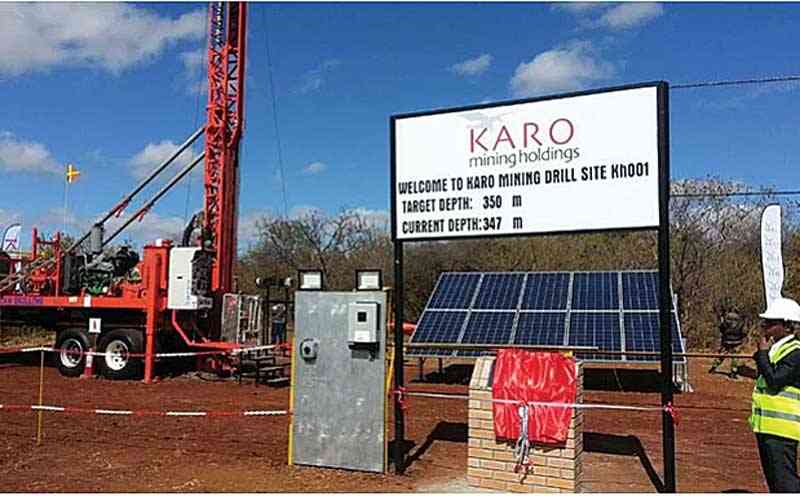
PLATINUM miner Karo Mining Holdings plans to raise US$260 million in debt capital to finance its flagship project in the country, NewsDay Business can reveal.
The firm is developing the Karo Platinum Project in Zimbabwe, covering 23 903 hectares located within the Great Dyke in the Mashonaland West province.
The project is an open-pit platinum group metals (PGMs) asset currently under construction at a cost of US$391m with an expected output of 194 000 ounces of platinum annually.
In a statement accompanying its financial results for the year ended September 30, 2023, the company said negotiations for the funding were advanced.
“Negotiations for the balance of the funding are on-going and the alternatives include commodity pre-payments, by-product and base metal streaming transactions, working capital facilities and possible strategic investors,” the statement reads in part.
“Advisors have been appointed to advise Karo Platinum on these alternatives. The prospects of success are considered high based on the long asset life of the project and core commodity fundamentals.
“The directors have and will continue to review the spending, investment and commitments in the project; and have prepared scenarios to match the project commitments and funding availability should it be required to maintain available funds for the foreseeable future.
“Consequently, the directors consider that, as at the date of approval of the consolidated financial statements, the group will continue to operate for the foreseeable future.”
- News in depth: Chinese scramble for Zim’s chrome leaves communal lands scarred
- Pushback over Chinese lithium push
- News in depth: Chinese scramble for Zim’s chrome leaves communal lands scarred
- Pushback over Chinese lithium push
Keep Reading
Tharisa plc earlier provided a loan facility of US$8m to fund the initial exploration activities and in 2022 this amount was settled by the company through the issue of new ordinary shares.
Karo added that Tharisa plc committed to provide US$135m funding.
“Of this amount, US$65m has been received. The balance of US$70m is available for draw-down. In addition, negotiations are in progress to raise US$260m debt capital in order to fund the Karo Platinum Project,” Karo said.
Meanwhile, the firm says it has raised US$36,8 through a United States dollar-denominated structured debt instrument that was successfully listed on the Victoria Falls Stock Exchange (VFEX).
The company said the funds raised were utilised in part-funding the development of Phase 1 of the project.
“In the current year, the company raised US$36,8m (excluding issue costs) through the issuance of listed bonds guaranteed by Tharisa plc on the VFEX in Zimbabwe. A fellow Tharisa Group Company, Arxo Finance, subscribed for US$10m of the bond raised.
“The bonds raised have a three-year maturity, a coupon interest rate of 9,5% per annum and biannual interest payments to bondholders. The first coupon payment was fully paid in June 2023. Also, the second coupon payment, which was due in December 2023, has already been settled,” the firm said.
Karo said the parent company supported the project with further equity injection of US$65 million during the period, which continues to be utilised to support the project’s working capital requirements.
Karo commenced with bulk earthworks and construction of civils in December 2022 while the first concrete was poured in June 2023.
The firm said in the same month, open pit pilot mining commenced with the objective of optimising the mining methods and producing ore to further test and refine metallurgical processing.
At nameplate capacity, Karo is expected to process approximately 2,5 million tonnes per annum of ore and produce 190 ounces of PGMs per annum.
It said the PGMs’ price environment necessitated a review of the commissioning timeline. First ore in the mill is now planned for June 2025, while the project workstreams have been divided into smaller commitments to ensure continued development aligned with funding availability.
Manufacturing of key long-lead items is nearing completion as of the statement of financial position date, according to Karo.










